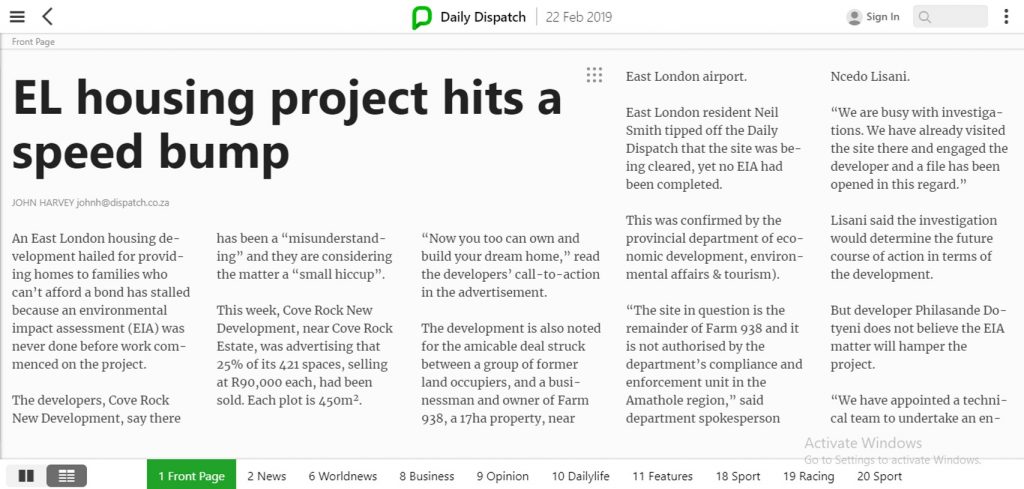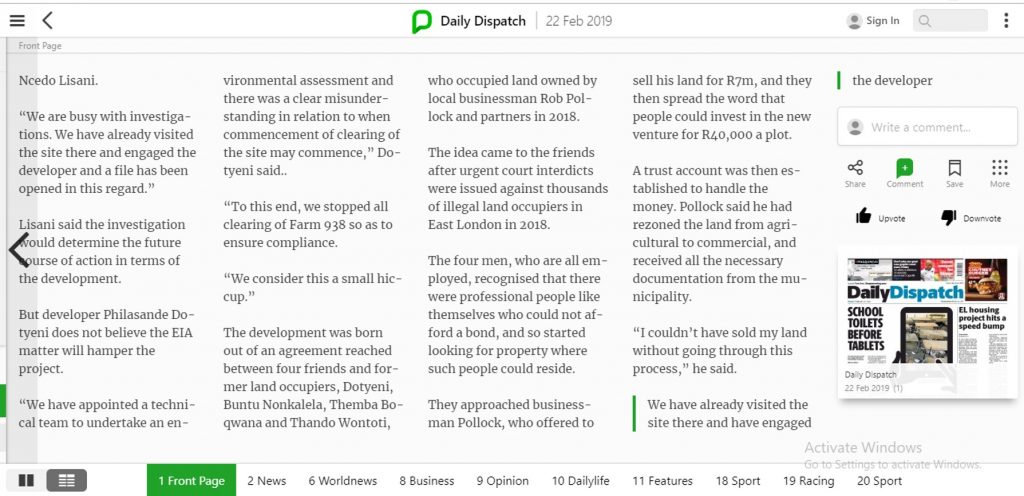MEDIA STATEMENT 2020-09-26
Over the past couple of months we have received much criticism over our approach with regards to solving the question of addressing land ownership problems that affect the low to middle income groups of South Africa. We have faced criticism both from established developers who have given us a backlash for our low pricing models for land currently on the market for millions. Their argument has been that we are causing harm to the property business and making our plots too cheap in the market. The second group of critics are those who seek to suggest that we have come up with this model to simply enrich ourselves. To them and to many naysayers we offer this response.
Background
As the engines for the national economy, South African municipalities are disproportionately exposed to many challenges which face communities directly. The current corona virus pandemic has exposed that those most vulnerable are the poor and black in particular. Poverty and a lack of adequate housing have been proven to be the proverbial 'Achilles Heel' in all South African communities. Our dense and overcrowded informal settlements, the inhumane conditions of people living in shacks and the needs of those working but who cannot access credit from banks to purchase properties makes the cry for access to affordable land even more relevant than ever before.
During the many incidents of land grabbing’s in the Buffalo City Metropolitan Municipality there emerged exemplar initiatives which demonstrated potential and decisive action by a few individuals that followed that adage “never let a good crisis go to waste”. The initiative by the Cove Rock New Development clearly harnessed and addressed the urgent predicament persistent in the structural economic inequalities of South Africa which, in particular, focused around issues of land/property ownership.
As obvious as this may seem, the existing challenges of municipalities, many of whom find themselves in a financial, political and management crisis will affect the overall fiscus and should see a general contraction in revenue collection and other incomes.
With the recent corona virus pandemic, loss in revenue from property rates and taxes will be affected greatly. This shall be significantly affected as a result of the inability by households and businesses to pay expenses. On a national scale, property rates and taxes account for between 15 and 22% of total revenue of municipalities. This is based on the 2020 findings by the department of cooperative governance and traditional affairs.
Our research findings
Our research into some of the housing/land challenges experienced by Buffalo City Metropolitan Municipality have presented us with some interesting observations:
§ Access by previously disadvantaged persons, who belong
to the low to middle income earning groups, to land ownership is a challenge.
This is attributed to the inability by such persons to qualify for housing as a
result of poor credit or too little disposable income.
§ However, an interesting observation was made that these persons could afford to purchase plots costing below R50 000 (fifty thousand) and successfully construct their beautiful homes. Bhongweni township is a clear example of this fact.
Our initiative
Cove Rock New Development is a workable model which can serve as a clear example of how the private sector can partner with private citizens to change the land ownership patterns of South Africa. In this model we have successfully managed to reach legal agreements with land owners, particularly farm owners with properties within the urban edge of BCMM. Once we are able to agree with owner’s as well as position ourselves with the necessary resources to go to market, we market and sell plots at affordable prices to the previously disadvantaged groups of South Africa. These plots are sold at minimal amounts only to cover the operational costs of the project as well as the purchase price of the land.
In this initiative, we created a special purpose vehicle to fund the upfront costs of land purchases and other associated costs of developments. We believe that by following this approach we can actually create emerging economic nodes for future cash flow for municipalities.
Request to Local Governments of South Africa
It is therefore imperative that municipalities begin to realize this important initiative and seek to radically reduce barriers that delay the expansion of this future revenue base. Plainly put, municipalities needs to fast track rezoning and subdivision application processes to accommodate developments such as Cove Rock New Development without imposing all the harsh and costly exercises imposed on normal developers. After all, our approach is developmental and benefits mainly previously disadvantaged persons and black in particular.
There are of cause many benefits for municipalities that are associated in following the proposed radical approach of fast tracking rezoning and subdivision without the strict requirements set for ordinary developers namely:
§ An emerging future flow of bulk service charge
§ Support township economies by ensuring previously disadvantaged persons, black in particular, have access to land with title deed. This will unlock the many conundrums that face previously disadvantaged persons when accessing bank loans for businesses (collateral).
§ Change how townships and their economies are regulated to benefit the previously disadvantaged groups.
§ Ensure more and more previously disadvantaged persons become owners of urban property
§ Promote more real estate development models such as ours that will see more and more previously disadvantaged persons exit the high
density townships they currently flock
§ This will accelerate the redistribution of urban land to previously disadvantaged persons with the use of available legislation currently
The scenario we are proposing calls for a need to have a more coordinated approach in approving new developments in all municipalities. It cannot be that the same old lengthy approach should be followed when dealing with developments such as ours.
There is a crisis and this should form part of the response mechanism undertaken by government.
ENDS!


